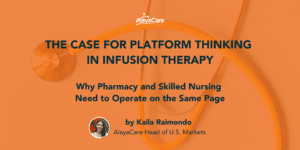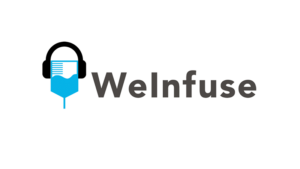Chris Cook, Vice President of Specialty Pharmacy and Jay Patel, Founder and CEO of Ivira Health share insights on patient experience, care coordination, revenue cycle management, working with payers, creating a company culture and contributing to the community on the WeInfuse podcast.
Creating a frictionless patient experience with Jay Patel and Chris Cook:
Where It Started
Jay Patel was a young pharmacist at age twenty-six that wanted to start an independent pharmacy so he started in the health care industry because he wanted to have an impact in the community pharmacy space. Over the years, he learned that there was a greater gap in care that needed to be served. Over time, more opportunities where community focused service was needed allowed him to grow from a small independent pharmacy to multiple independent pharmacies throughout Pennsylvania, New Jersey, Delaware, and into the care coordination business, as well as the infusion space. Jay and Chris met Reece and Bryan at NHIA in March of 2019. They started having a conversation about what it would look like to get into home infusion, but Reece and Bryan suggested thinking about alternate site of care or ambulatory infusion and the rest is history.
Pharmacist & Payer Perspectives Come Together
Ivira Health has a “beautiful marriage.” Jay brings a patient angle, and Chris brings the payer angle. But, for Jay, the patient experience was the most important thing for him being the CEO. He wanted an ease of scheduling appointments, comfortable rooms, easy access to providers and clinicians, and down to the small things like answering the phone within a couple of rings and not having to follow prompts to speak to someone. Chris brought another view to their team.
He owns and operates the specialty pharmacy side of their business, and he was able to bring over his past experiences to infusion. A prior authorization is needed for a lot of the expensive biologics or infusible therapies, there might be step therapy, or a medical policy and how that relates to a clinical condition. There’s also financial assistance component. They have a staff that understands that and helps them to move that piece of the business.
Another nice aspect to their business is their care coordination side is in the same building as the infusion center and provides disease education for a lot of primary care and specialist patients. Some people can’t understand how they ended up with chronic conditions, so it helps to have a pharmacist come in while these patients are getting their infusion and have the pharmacist go through what is the disease state, what is the background of the condition, what are some of the things that the patient can do to better manage the condition, how they can manage it with diet and exercise, help prevent the progress of the condition. It’s a great value add for the patients and referring physicians.
Sharing Failures So You Can Learn
We could probably put a $500,000-dollar number on the hurt. The most important thing you can focus on as a practitioner is billing. Jay and Chris were able to work with skillful players in the field to save them. Making sure that you understand the life cycle of medical billing and understanding that is not pharmacy billing is vital. In the pharmacy world, you’re used to, “Hey, if you get your medicine, and bill the insurance today, right now in less than 10 seconds, you will get an answer whether you are going to get paid and you will know what you’re going to get paid. In the medical world, that guarantee does not exist. Having a robust team that can do your benefits checks, prior authorizations, and guarantee that you are in-network to make sure your cash flow is manageable for 6, 10, or even 12 weeks is one of the most important things. Billing needs to be at the forefront of everything that you do.
From an entrepreneur perspective, Chris suggested you really need to do your due diligence in anything you do. If there is something that we feel that might be an opportunity, we’ll go after it and sometimes that’s taking a risk. Not all the time does that mean that you’re going to succeed with that venture. Part of success is being able to accept failure. But if you succeed, all the better.
Parting Advice
Identifying a culture within your organization and improving patient experience is probably the most paramount thing to a company, especially as you grow. You want people to have or resonate with the same values that you have as a company and that helps you identify the type of talent that you want. It’s not just the tangible skills or if they’re clinically gifted, but are they self-motivated? Are they willing to wake up early and do research? Are they willing to put in the sweat equity? It’s establishing those values and creating a culture and then hoping that you can bring in people that will mold to that culture.
When Jay started his first business, he was twenty-five. He quit his secure job and had nothing but debt and no car. His mentality was “What’s the worst that could happen?” and everyone around him supported that. At the end of the day, he had a pharmacy degree and could go back to work making a six-figure salary. It gave him foolish arrogance to trek forward and do something better for the community. In return, he learned that the more you give back to the community that you serve, the more the community will always give back to you. Year one, the pharmacy succeeded. Year two, a second location. Year three, two more locations. Year four, five, and six today, they are now a very large organization serving thousands of patients across multiple states across pharmacy infusion and care coordination. None of that would be possible without taking the risk of foolishness.
It’s easy to say, “let’s take a risk.” It’s hard to know when that risk is a calculated risk versus that risk is a calculated risk doing good for the world. That’s the most important thing. If you’re doing good for the world, the world will always be there for you to hold you up. That’s what Jay’s parent taught him, and his partners have always seen in the past few years.
They’ve done some foolish things where it may not have always made business sense, but it made sense in supporting the population that they were promoting in their community. It made sense to the patients of the doctors that we support. Financially, it may not have always made sense, but in the end, it’s always paid dividends. Those are the risks that are the most worth taking, honestly.




